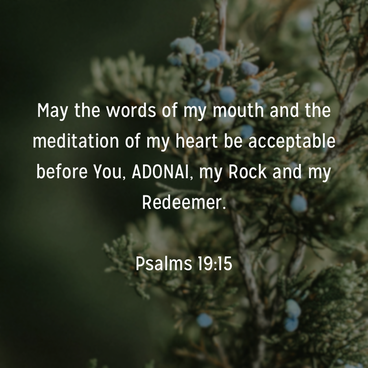|
Good morning!
We're so glad you decided to join us!
If you have any hymn requests, or ideas for our morning prayer, please let me know! I've also found an online tool to find hymns to go with scripture. If you have a favorite scripture, I can look up a hymn to go with that, too! You can either email the church ([email protected]), or you can call or text.
This week, our hymn references a suggestion for Philippians 4:13:
I can do all this through him who gives me strength.
When we meet together in person, we share our joys and concerns together. Take some time to think about your past week. What made you happy, thankful, or joyful? What made you feel worried or sad?
This week, we will use the Prayer of St. Francis of Assisi. We will pray the first part together. Then, in the middle, pray for your own joys and concerns. You may also want to pray for those people on our continuing prayer list. Then, we will pray the end of the Prayer together.
Lord, make me an instrument of your peace.
Where there is hatred, let me sow love. Where there is injury, pardon. Where there is doubt, faith. Where there is despair, hope. Where there is darkness, light. Where there is sadness, joy. [Pray for your joys and concerns here.] O Divine Master, grant that I may not so much seek to be consoled, as to console; to be understood, as to understand; to be loved, as to love. For it is in giving that we receive. It is in pardoning that we are pardoned, and it is in dying that we are born to Eternal Life. Amen.
Our Sunday School lessons come from our adult Sunday School book. All of the scripture references are linked to an online text. These are shown bold and underlined. Just click on the link to open the scripture in a new window.
This week’s lesson is on James 2:14-26. Introduction: “A Right Strawy Epistle” On October 31, 1517, Martin Luther nailed a list of 95 points of disagreement with medieval Roman Catholic doctrine to the door of the Castle Church in Wittenberg, Germany. He had come to see that Catholicism’s position on the role of works in salvation did not match the apostle Paul’s emphasis on justification by faith. As debates heated up, the letter of James became more and more a source of frustration for Luther. Representatives of the pope kept quoting it to him in reply to his assertions about justification by faith. By the time Luther published his German translation of the New Testament in the 1520’s, he had come to view the letter of James as a “right strawy epistle … [that] has nothing of the nature of the gospel about it.” Luther believed he was justified in this conclusion for three reasons: (1) James seems to contradict Paul, (2) James makes no mention of Jesus’ death or resurrection, and (3) James himself wasn’t of the same caliber as Paul and other apostles. Consequently, Luther moved James, Hebrews, Jude, and Revelation from their positions in the Bible at the time and placed them in a separate section at the end of the New Testament. Luther’s attitude about James eventually mellowed. But many Christians still have a hard time reconciling James with Paul on the role of works. Today’s lesson revisits this issue in a limited way. Lesson Context The Lesson Contexts of the last two lessons apply here as well, so that information need not be repeated. But before we move into today’s text, it will be helpful to consider the larger context of the central idea of today’s lesson. For all the controversy that James 2 has generated on the role of works over the centuries, it can come as a surprise to see how often works are related to salvation elsewhere in Scripture. Consider the scene Jesus paints in Matthew 25:31-46. In the judgment, individual believers are judged on the basis of what they have done or not done -- their works. Also, a pointed statement is Revelation 20:12-13, where the apostle John says he ... saw the dead, great and small, standing before the throne, and books were opened. Another book was opened, which is the book of life. The dead were judged according to what they had done as recorded in the books. The sea gave up the dead that were in it, and death and Hades gave up the dead that were in them, and each person was judged according to what they had done.
As important as that issue is, it's easy to allow it to overshadow something else James stresses: the specific economic needs -- the reality of life for so many in the ancient world -- that drives much of his thoughts in James 2. The first half of the chapter (verses 1-13) warns against discriminating against the poor in favor of the rich; economic need also is an integral part of his argument regarding faith and works in the second half -- today's text.
Lesson When we meet in person, we discuss the scripture lesson, especially as it relates to our lives. This can include observations, questions, and connections. Take some time to think about your answers to the questions below, which come from our adult Sunday School book. These questions can be difficult to answer, and don't necessarily have one right answer. If you are reading the lesson with someone else, discuss your thoughts together. You can always share your thoughts and questions as a comment below.
Article: Vice and Virtue
When I was young, our church fellowship gave lip service to saving faith. We were wary of practicing dead faith, so we tended to focus on doing things that we thought would show our true faith. Looking back on those days, though, I can see that to prove our faith we often focused not on things to do but on things not to do! We were expected to avoid certain vices because those were behaviors that indicated we did not have saving faith. Yet I can't remember hearing many sermons on developing virtues instead. We were against many practices, but it wasn't always easy to identify what we were for. In retrospect, our focus seemed to be more on ourselves than on others. It could be argued that we were negating the teachings of both James and Jesus by releasing ourselves of responsibility to others. How do you live out your "for" faith? Article: Antiheroes An antihero is a character who doesn't display classic heroic traits but is nevertheless the protagonist and unlikely hero. Antiheroes have a significant place in history, sometimes playing an evil or good role, but more often an ambiguous one. Robin Hood and his band of merry men are a great example. Most heroes don't steal from anyone, rich or poor. And in the original stories, Robin Hood didn't just steal -- he killed! The story was later sanitized, with Robin Hood outwitting the wealthy to steal their excess and nobly giving his loot to the poor. Then there is the prostitute Rahab. She was one of the Bible's many antiheroes, mentioned by James as an example of faith that works. Rahab's story shows us how the Bible tells it like it is. She is an example of the fact that God uses flawed people to accomplish his work. That gives hope to all of us potential antiheroes doesn't it?
Conclusion
In popular usage, faith often equates to mere belief, an intellectual acknowledgment of the existence of God. James shows us that true, saving faith goes much deeper than this: it touches every aspect of our lives and guides our every action. The examples that James uses -- Abraham and Rahab -- highlight these points. Consider that it was not Abraham's mere acknowledgment of God's promise that justified him. Rather, it was his action on the basis of that promise that justified him. Likewise, it was not mere verbal acknowledgment of the Israelites' God that justified Rahab (Joshua 2:8-9). That acknowledgment went hand in hand with her actions in sheltering Israelite spies from certain death (Joshua 2:2-4). She undoubtedly risked her own life in doing so. Certainly, we are saved through faith, not by works (Ephesians 2:8-9); we cannot earn salvation by our works (Romans 3:27; Romans 9:32; Galatians 2:16). But what type of faith saves? The type that works. A profession of faith must be accompanied by action; otherwise it is not faith at all. A profession of faith that is unaccompanied by the works God intends we do brings disrepute on the faith we claim to have. Unless the Word is changing us inside and out -- in heart and mind to speak and act -- our faith will be no faith at all. Prayer Father, may our faith in you not be limited to a mere affirmation of your existence. Instead, may it be manifested in the way we live, including the way we extend help to those in need. In Jesus' name we pray. Amen.
Next week's lesson is on James 3:1-12.
0 Comments
Leave a Reply. |
AuthorWe are a small, rural Presbyterian church in southwestern Pennsylvania. Archives
July 2024
Categories
All
|



 RSS Feed
RSS Feed